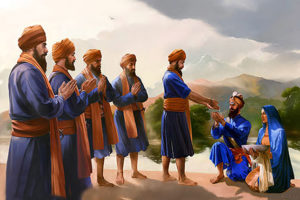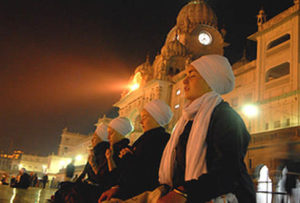Our Values

Core Values
1. One God:- of all the Universe – The fundamental belief of Sikhism is that God exists, not merely as an idea or concept, but as a Real Entity, indescribable yet knowable and perceivable to anyone who is prepare to dedicate the time and energy to become perceptive to His persona. The Gurus never spoke about proofs of the existence of God: For them He is too real and obvious to need any logical proof.
Equal rights for the Woman
2. Gender equality:- From about 1499, woman has always been regarded as equal with man and has all the rights and privileges enjoyed by a man. She is considered to have the same soul as man and has equal right to grow spiritually. The Sikh woman is allowed to lead religious congregations, to take part in Akhand Path (the continuous recitation of the Holy Scriptures), to perform Kirtan, to work as Granthi (priest) or a preacher and to participate freely in all religious, cultural, social, political and secular activities.
Equality of all Mankind
3. Race equality:- The Sikh Gurus have emphasised the concept of the equality of mankind in the sacred verses found in the Sikh holy scripture, Guru Granth Sahib. Guru Nanak says in Japji Sahib: “Accept all humans as your equals, and let them be your only sect” (Japji 28).And Guru Gobind Singh in his compositions tells the world: “manas ki jat sabhe eke paihcanbo – recognise all of mankind as a single caste of humanity”. Therefore, Sikhs believe that all human beings are equal. “We are all sons and daughters of Waheguru, the Almighty Lord” is the message promoted by the Sikh Gurus.
Focus on & Remember God
4. Remember God:- This part of the three pillars of Sikhism; the remembrance of God by repeating and focussing the mind on His name and His blessings. The names given to God primarily refer to the attributes of the Almighty and His various qualities. The guideline in the Sikh scriptures demands that the Sikh engages in Naam Simran as part of his or her everyday routine.
Work hard in life
5. Honest work:- To work and earn by the “sweat of the brow”, to live a family way of life, and practice truthfulness and honesty in all dealings is a fundamental part of Sikhi. The term mean to carry out good deeds and earn a honest, pure and upright livelihood by exercising ones God given skills, abilities, talents and hard labour for the benefit and improvement of the individual, their family and society at large.
Share with others
6. Share with others:- to share ones wealth with others in the community, to give to charity, to distribute in Langar (free Kitchen) and to generally help others in the community who need help. A Sikh is expected to contribute at least 10% of their wealth/income called Dasvandh to the needy people of the world or to a worthy cause.
Help others
7. Do Sewa:- is a word used to refer to “selfless service”, performed without any thought of reward or personal benefit. All Sikhs are encouraged by their Guru, Guru Granth Sahib to perform selfless voluntary service for the community. This is not only good for community relations but also is good for the moral uplifting of the person. Sikhs should engage in in free service in Gurdwaras washing dishes, cleaning the floors, serving food; in community centres; in hospitals, etc
Protect the rights of others
8. Respect for rights of others:- In this regard, the ninth Nanak, Guru Tegh Bahadur provides a very valuable lesson for the Sikhs and for the other concerned peoples of the world relating to the security and protection of all human beings within our society. It is very common for communities to protect their own members. The evidence for this, is well documented in the history of mankind.In protecting or seeking to spread their own religious beliefs or their own traditions or culture, they sometime decimate or destroy the beliefs and ways of others; when one becomes self-centred on ones “own people” or ones “own religion”, or ones “own community”; this can become the beginning of serious problems and many major conflicts have started in this way. The Guru showed the world how one should care for their neighbour and protect their rights; He stood by the Kashmiri Hindus to protect their way of life.
Be ever ready to sacrifice for others
9. Right to defend:- Guru Gobind Singh has very clearly set the mission for the Sikhs to tread the unique path of Akal Purakh ki Fauj – the ‘Army of Lord’ to protect and serve all the peoples of the World – only then can it be rightly called “Akal Purakh ki Fauj”. When the Khalsa starts serving the needs of a few, or starts being concerned only with itself, it will fail in its duties as set out by the tenth Guru.
Be fearless
10. Fear none but God:- It is known that fear is an emotional response to threats and danger. Although fear is different from anxiety, which typically occurs without any external threat, the two bring much pain and misery to the person who is suffering from these two emotions. Fear is related to the specific behaviours of escape and avoidance, while anxiety is the result of threats that are perceived to be uncontrollable or unavoidable.The Guru Granth Sahib offers guidance on how one should become fearless in their life. The trials and tribulation of modern life means that both these ailments are on the increase in the world; many suffer from anxiety and fear due to losing one’s identity and/or security; from constant and sustained financial, health and emotional pressures; from humiliation, oppression, victimization, feelings of inferiority, persecution of one’s group, and other kinds of discrimination, etc. These external agents are relentless and become such a strain that many suffer constantly in pain.
Care for all humanity
11. Sewa and support for the weak:- Sikhism is founded on the principles of Sarbat da bhalla – working towards the “common good of all”. For Sikhs, this means reaching out to serve and uplift all of humanity as an expression or devotion to the Creator. Many other Sikh institutes, such as Guru-ka-Langar, Kirtan, Paath, etc., depend on the performance of Seva by many in the congregation. So the principles of Seva underpin many Sikh values – such is the importance given to Seva in Sikhism.Seva or Karseva also shortened to ‘Sewa’ is a word used to refer to “selfless service” or “free-voluntary service”, performed without any thought of reward or personal benefit. Doing ‘Seva’ is a central Sikh tenet; all Sikhs are encouraged by their Guru (Guru Granth Sahib) to perform Seva or Selfless Service within the community. Not only is this good for community relations but it is also good and moral uplifting of the person performing the voluntary service.
Live to the highest spiritual level
12. Live to the highest spiritual level:- O Lord, give me this boon. May I never ever shirk from doing good deeds. Never may I fear when I go to fight the enemy. With surety, victory will be mine Be bold and positive in your life; do not shirk away from doing good despite obstacles; pursue good missions to the end.
Be gentle, act with humility



